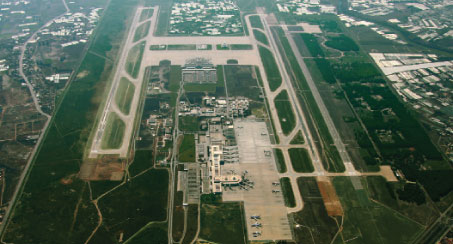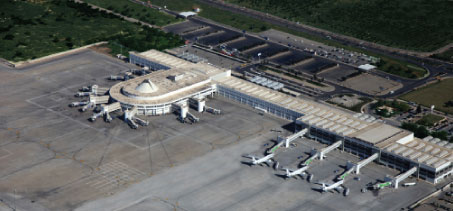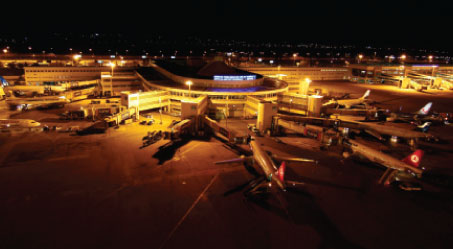
With a 630km shoreline on the south coast of Turkey, Antalya is an important tourist destination in the region and ICF Airports is also focused on promoting the potential for traffic outside the summer season.
Antalya Airport handled 22.3 million passengers in 2010 – up +18.8% on the previous year. The number of domestic passengers grew by +19.4% to around 4 million, while international traffic increased by +18.8% to around 19 million. For 2011, year-to-date growth currently stands at +28%, with throughput for the year as a whole forecast to rise to 25 million.
The joint venture was awarded the €2.4 billion concession in 2007 to operate the airport for a period of 17 years. Fraport has been active at Antalya for more than 10 years and as a shareholder in ICF Airports, it seconds management to the airport and offers operational and commercial support where required. ICF Airports also participates in workshops with Fraport and its subsidiaries, at which knowhow and best practice are exchanged.
The promotion of the Antalya region and Turkey as a whole is at the heart of ICF Airports’ strategy, particularly in the key target markets of Germany and Russia, but also in developing markets such as the UK, Scandinavia and the Middle East countries. The operator collaborates with the Association of Mediterranean Tourism (AKTOB) on joint promotions. “One result of this cooperation is that advertisements for Antalya as a destination are on display all over Frankfurt Airport, which hosts nearly 55 million tourists from all over the world every year,” commented Laukenmann.
The political changes in the Middle East and North Africa will, in the medium-term, strengthen those countries’ tourism potential, according to Laukenmann. “In the short-term, the situation in the Middle East and North Africa has given ICF Airports the opportunity to promote Antalya, especially in the low season,” he said. “As an ad hoc measure, we approached Russian tour operators to relocate traffic from these destinations to Antalya. The increase in passenger numbers (+19.7%) was, therefore, impressive in February compared with last year.”

Laukenmann: “Though not contractually required, we demolished the old domestic terminal, which was not suitable for Antalya due to its domestic traffic growth. We built a new high quality terminal, which better suits Antalya from an operational and commercial perspective.”
That said, there is a definite seasonality to Antalya’s traffic; of the 22.3 million passengers handled in 2010, 85% of those travelled in the summer season – between May and October. ICF Airports is promoting the potential for traffic in the remaining months of the year both nationally and internationally, with Laukenmann highlighting the mild weather, state-of-the-art hospitals for health tourism, excellent golfing and trekking infrastructure, and well-preserved historic sites for those seeking a cultural break.
84% of Antalya’s traffic is international and 16% domestic. The airport mainly handles charter traffic, with the top five airlines being the Turkish carriers Sky Airlines with a 12% market share, Sun Express (10%) and Pegasus (4.7%), and Russian carriers Orenburg Airlines (4.2%) and Transaero (4.1%). Laukenmann explained that none of these are considered real low-cost carriers. Commenting on Antalya’s competitor airports, he said: “Palma de Mallorca can be considered as a competitor in terms of charter traffic in the Mediterranean region.”
ICF Airports provides marketing support when airlines launch new destinations from Antalya. This takes the form of advertising in magazines and on city buses, press conferences, workshops, newsletters and website banners. Additionally, there are discounts on landing and parking fees during specific periods:
- 75% discount in both landing and parking fees between 24:00 and 05:00 from 30 October to 30 April;
- 50% discount in both landing and parking fees between 05:01 and 23:59 from 30 October to 30 April;
- 50% discount in both landing and parking fees between 24:00 and 05:00 from 1 May to 30 September.
Increasing passenger-spend
Commercial revenues represent 42% of the overall total, with duty free revenues the biggest contributor. Increasing commercial revenues is an area of strategic importance for Antalya Airport, and their focus is on increasing conversion and sales-per-passenger. “To increase penetration, you need new concepts, direct passenger flow into the shops, more dwell time and activities. To increase sales-per-ticket, you need product diversity, the correct price policy and promotions,” explained Laukenmann. “For this purpose, we have also implemented ‘Open Gate’ in Terminal 1 to increase dwell time and all retail facilities have been modernised.”
ICF Airports changed its departure gate concept in Terminal 1 earlier this year from a dedicated closed gate to open gate. All partitions between the gates have been removed and all gate security equipment has been relocated in a centralised area before passport control. This has had the effect of speeding up passenger flows, particularly during peak hours. “After these modifications, the process time per passenger has significantly decreased and has created additional spare time for their comfort and shopping before boarding the aircraft. Open Gate has increased dwell time by 30-45 minutes, which directly links with penetration and per-passenger spend,” said Laukenmann.
The €100 million Domestic Terminal (T3) was officially opened in April 2010. The 36,601sqm facility has an annual capacity of 9 million passengers, making it 74% larger than the building it replaced. It also has four state-of-the-art passenger boarding bridges, which the old facility did not have.
Laukenmann explained: “Though not contractually required, we demolished the old domestic terminal, which was not suitable for Antalya due to its domestic traffic growth. We built a new high quality terminal, which better suits Antalya from an operational and commercial perspective. Since opening, we have received very positive feedback from passengers, the airlines and the authorities.”
Environmental strategy

Promoting the Antalya region and Turkey as a whole is key to the ICF Airports strategy, particularly in the key target markets of Germany and Russia, but also in developing markets such as the UK, Scandinavia and the Middle East countries.
Antalya Airport has a comprehensive strategy to reduce its environmental impact and in April was accredited at the ‘Reduction’ level of ACI EUROPE’s Airport Carbon Accreditation. The airport’s initiatives include building a state-of-the-art, energy efficient tri-generation power plant, which is gas-fuelled and uses excess heat for heating and cooling purposes. ICF Airports is also responsible for all waste water treatment at the airport. “In order to minimise our ecological impact, we operate a modern waste water treatment factory, as well as a waste separation plant with a high recycling rate,” commented Laukenmann.
The waste water treatment plant prevents pollution of the soil and the sea with discharged waste water; the daily system capacity is 4,500m3 and in 2010 nearly 300,000m3 of waste water was processed. Meanwhile, at the waste separation plant, 21% of total waste was recycled in 2010.
Other initiatives include modernisation of IT equipment with a ‘virtual server’, which is said to have provided a 50% saving in electricity consumption.
Laukenmann said: “We have been awarded ISO certifications in the fields of Quality Management Systems, Environment Management Systems, Customer Satisfaction and Occupational Health Systems, as well as Airport Carbon Accreditation and the Turkish Green Airport Certificate.”
In order to develop public awareness on the environment, ICF Airports has signed an agreement with CEVKO – a non-profit foundation established to spread environmental awareness and increase recycling around Turkey. A green balloon is used as a symbol of the airport’s environmental activities and is designed to improve the awareness of passengers and employees. Indeed, all ICF Airports’ staff and business partners undertake environmental training.
ICF Airports has a clear strategy to capitalise on the dynamic growth of the Turkish aviation market. Its route development strategy couples maintaining existing key markets such as Germany and Russia with developing new markets, such as the UK, Scandinavia and the Middle East countries. With a 630km shoreline on the south coast of Turkey, Antalya is an important tourist destination in the region and ICF Airports is also focused on promoting the potential for traffic outside the summer season. The +28% growth in throughput recorded so far in 2011 suggests the future is bright for Antalya Airport.







